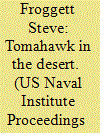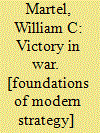| Srl | Item |
| 1 |
ID:
004333


|
|
|
|
|
| Publication |
United States, Deptt. Of Commerce,NTIS, 1992.
|
| Description |
xxxi,415p.;figures
|
|
|
|
|
|
|
|
|
|
|
|
Copies: C:3/I:0,R:0,Q:0
Circulation
| Accession# | Call# | Current Location | Status | Policy | Location |
| 034906 | R 355.0209536/US.1-3 034906 | Main | On Shelf | General | |
| 034907 | R 355.0209536/US.1-3 034907 | Main | On Shelf | General | |
| 034908 | R 355.0209536/US.1-3 034908 | Main | On Shelf | General | |
|
|
|
|
| 2 |
ID:
175673


|
|
|
|
|
| Summary/Abstract |
Following the Persian Gulf War, many asserted that the American military exorcized the demons of the Vietnam War. It was inappropriate to make this claim since the war was reminiscent of the conventional conflicts the United States was involved in earlier in the twentieth century. While examining America’s unconventional conflicts since the failure in Vietnam, one recognizes Washington is still having trouble dealing with them. It is especially difficult for the world’s lone superpower to establish stability in the nations where fighting is taking place. Certain officials in the U.S. government believe residual forces can produce order over the course of time. Within this article, though, it will be demonstrated that residual forces seldom generate such an outcome.
|
|
|
|
|
|
|
|
|
|
|
|
|
|
|
|
| 3 |
ID:
014807


|
|
|
|
|
| Publication |
Jan 1992.
|
| Description |
71-75
|
|
|
|
|
|
|
|
|
|
|
|
|
|
|
|
| 4 |
ID:
148392


|
|
|
|
|
| Summary/Abstract |
This article argues that the relationship between the United States and Japan can be understood as a security community. According to Karl Deutsch, collective identity is a defining feature of a security community. Hence, this study employs the case of the Persian Gulf War of 1990–1991 to detect the existence of a collective identity between the United States and Japan. Employing Bruce Cronin’s approach, we examine how the United States and Japan interacted with each other in their discourse and behavior during the period of the war from August 1990 to April 1991. This article presents evidence of their shared collective identity in verbal exchanges and in a series of mutual behaviors regarding Japan’s role in an anti-Saddam coalition.
|
|
|
|
|
|
|
|
|
|
|
|
|
|
|
|
| 5 |
ID:
108745


|
|
|
|
|
| Edition |
Rev. Ed
|
| Publication |
Cambridge, Cambridge University Press, 2011.
|
| Description |
xi, 578p.
|
| Standard Number |
9780521177733
|
|
|
|
|
|
|
|
|
|
|
|
Copies: C:1/I:0,R:0,Q:0
Circulation
| Accession# | Call# | Current Location | Status | Policy | Location |
| 056357 | 355.033573/MAR 056357 | Main | On Shelf | General | |
|
|
|
|